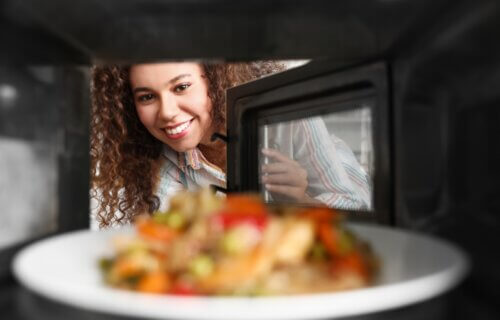Microwaves are one of the most magical kitchen interventions. You can take your meal from frozen to piping hot literally within seconds. There’s no need to reheat your food on the stove or in the oven; just pop your meal in the microwave and close the door. Despite how useful the technology is, however, you might be wondering if having a hot-and-ready meal this easily can be unhealthy in some way. Let’s dive in.
Microwaves cook by using electromagnetic waves that are absorbed into the various molecules of your food. This makes them vibrate and generate heat to cook things from the inside out. The waves used typically fall into a specific frequency range in order to trigger the reaction. It’s important to know that cooking using any method, whether it’s frying, boiling, or stir-frying, will affect nutrient composition in some way.
Even if you just cut your veggies too much, nutrients can be lost in the process. For instance, boiling and blanching vegetables has been shown to destroy vitamin C content, while one study shows microwaving didn’t have as strong of an impact.
Carbs, fats, proteins, and fiber do not change or go away due to microwaving because these provide the energy your body needs to get from the food. In fact, there are some nutrients that microwaving has been shown to preserve.
Since microwaves typically lower temperatures and require less time to cook food than other methods, this helps prevent excessive nutrient loss. Some data shows that sodium, potassium, and phosphorus content was preserved after microwaving. Foods like sweet potatoes and carrots contain antioxidants, namely beta-carotene, which are actually better absorbed after cooking.
The same goes for an antioxidant called lycopene in tomatoes. There are some enzymatic shifts that occur because the technology causes water molecules in food to vibrate, but this happens in virtually any cooking method with heat involved. This also happens to B vitamins, like thiamine and folate, as nutrient loss occurs when heat is present.
Can you stand in front of a microwave while it’s on?
In theory, standing in front of a microwave while in use is generally considered safe because of the strong safety standards that manufacturers have to abide by. They are designed to prevent radiation from leaking out. Even though microwave radiation complications are rare, the U.S. Food and Drug Administration (FDA) still advises people not to stand nearby in case there’s a leak or damage that you can’t see with the naked eye.

Bottom Line
Nothing bad is going to happen to you or your food by using a microwave properly. They make life so much more practical! There are some shifts in nutrient content and enzyme status, but this isn’t unique to just microwaves.
All forms of cooking will change nutrient composition in some way, whether positively, negatively, or both. Overall, studies actually show that microwaves may help preserve certain minerals and antioxidants. Moreover, it’s important to remember that certain antioxidants, like those in carrots, bell peppers, and tomatoes, become “unlocked,” so to speak, by cooking. Just remember to distance yourself and try not to watch your food spin around while it’s heating, as current government recommendations say that’s the safest thing to do.
